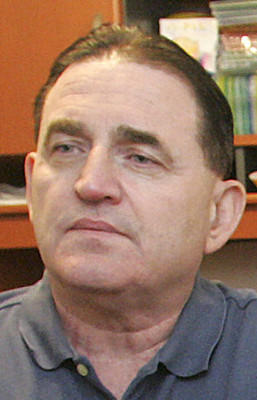Overhauling VA funding
As the nation remembers U.S. military personnel who made the ultimate sacrifice for America's freedom, disabled Vietnam War veteran Joseph Violante also will be thinking about the hundreds of thousands of veterans who live with physical and mental scars from war.
Violante, an attorney who is the Disabled American Veterans national legislative director, is spearheading an effort to urge Congress to change how the Department of Veterans Affairs is funded.
The organization's goal is to improve the way the VA can meet the needs of those who've been wounded, particularly more than 300,000 from wars in Iraq and Afghanistan who will need a lifetime of health care.
"I think about the friends I lost during my time in the Marines," Violante said Thursday. "And I think about those who are coming back now with physical and mental scars. Every day I think about that, and it keeps me going."
Violante, 57, said the VA needs Congress to ensure health care funding in advance, expected to be $30 billion next year, so that administrators can provide the care without delays.
"The VA health care budget is discretionary, at the whim of Congress and the administration," he said. "Over the last 19 years, it's been late 17 times, and five of those times as late as 31/2 months.
"Just like any other business, if your income isn't flowing, you aren't able to provide the services," he said.
"This is not new. The urgency here is the fact there are new disabled veterans every day coming into the system. That's only going to get worse as the situation continues."
In an effort dubbed "Stand Up For Veterans, They Stood Up For Us," the Disabled American Veterans announced this month it is mobilizing its 1.3 million members to demand that Congress pass legislation to resolve the health care funding crisis.
In Nevada, Violante's push to get money for disabled vets in a more timely fashion is backed by Disabled American Veterans Department of Nevada Commander Wayne Willson and Department Adjutant Bill Anton, of North Las Vegas.
"After Congress votes to appropriate funds, there is a significant time delay before the VA receives the money to facilitate care of our veteran population," Anton said.
The VA Southern Nevada Healthcare system serves more than 35,000 patients a year, and the 240,000 veterans in Nevada represent about 8.9 percent of the state's 2.7 million residents. Nevada has one of the fastest growing populations of veterans in the United States, according to the VA.
Anton said disabled veterans and all vets in need of care are "eagerly awaiting the completion of construction of our new hospital."
Construction on the site on the north side of the valley began in October 2006 and is targeted for completion in mid-2011. The hospital will be complemented with four primary care facilities strategically located around Las Vegas to handle more routine care.
"The DAV certainly supports enhanced support for our Operation Iraqi Freedom and Operation Enduring Freedom veterans, but we do not want the VA to slight those veterans from previous wars who have earned their benefits and are entitled to health care in the same fashion," Anton said.
Violante noted that the war on terrorism has created a different challenge for the VA.
"It's certainly a war where we've seen more severely disabled veterans coming back alive. They're being exposed to IEDs (improvised explosive devices) causing multiple trauma, loss of limbs, impacts on internal organs and traumatic brain injuries.
"The cost of care skyrockets when you have so many disabilities to be addressed," Violante said.
He said the Disabled American Veterans strategy to fix the funding lag is to pursue legislation that will give the VA funding a year in advance for health care.
"We're working with both chairmen of the Senate and House veterans affairs committees to make that happen," he said.
In addition, other initiatives are tailored to resolve mental health issues and deal with problems unique to women veterans who suffer from post traumatic stress disorder and amputations.
"There are a number of bills dealing with traumatic injuries," Violante said.
Contact reporter Keith Rogers at krogers @reviewjournal.com or 702-383-0308.


















